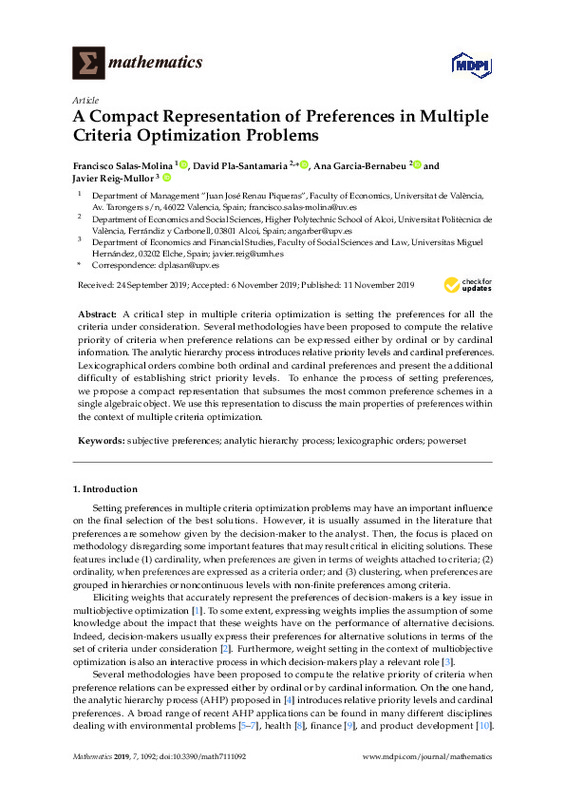JavaScript is disabled for your browser. Some features of this site may not work without it.
Buscar en RiuNet
Listar
Mi cuenta
Estadísticas
Ayuda RiuNet
Admin. UPV
A Compact Representation of Preferences in Multiple Criteria Optimization Problems
Mostrar el registro sencillo del ítem
Ficheros en el ítem
| dc.contributor.author | Salas-Molina, Francisco
|
es_ES |
| dc.contributor.author | Pla Santamaría, David
|
es_ES |
| dc.contributor.author | Garcia-Bernabeu, Ana
|
es_ES |
| dc.contributor.author | Reig-Mullor, Javier
|
es_ES |
| dc.date.accessioned | 2020-02-01T21:00:54Z | |
| dc.date.available | 2020-02-01T21:00:54Z | |
| dc.date.issued | 2019 | es_ES |
| dc.identifier.uri | http://hdl.handle.net/10251/136159 | |
| dc.description.abstract | [EN] A critical step in multiple criteria optimization is setting the preferences for all the criteria under consideration. Several methodologies have been proposed to compute the relative priority of criteria when preference relations can be expressed either by ordinal or by cardinal information. The analytic hierarchy process introduces relative priority levels and cardinal preferences. Lexicographical orders combine both ordinal and cardinal preferences and present the additional difficulty of establishing strict priority levels. To enhance the process of setting preferences, we propose a compact representation that subsumes the most common preference schemes in a single algebraic object. We use this representation to discuss the main properties of preferences within the context of multiple criteria optimization. | es_ES |
| dc.language | Inglés | es_ES |
| dc.publisher | MDPI AG | es_ES |
| dc.relation.ispartof | Mathematics | es_ES |
| dc.rights | Reconocimiento (by) | es_ES |
| dc.subject | Subjective preferences | es_ES |
| dc.subject | Analytic hierarchy process | es_ES |
| dc.subject | Lexicographic orders | es_ES |
| dc.subject | Powerset | es_ES |
| dc.subject.classification | ECONOMIA APLICADA | es_ES |
| dc.subject.classification | ECONOMIA FINANCIERA Y CONTABILIDAD | es_ES |
| dc.title | A Compact Representation of Preferences in Multiple Criteria Optimization Problems | es_ES |
| dc.type | Artículo | es_ES |
| dc.identifier.doi | 10.3390/math7111092 | es_ES |
| dc.rights.accessRights | Abierto | es_ES |
| dc.contributor.affiliation | Universitat Politècnica de València. Departamento de Economía y Ciencias Sociales - Departament d'Economia i Ciències Socials | es_ES |
| dc.description.bibliographicCitation | Salas-Molina, F.; Pla Santamaría, D.; Garcia-Bernabeu, A.; Reig-Mullor, J. (2019). A Compact Representation of Preferences in Multiple Criteria Optimization Problems. Mathematics. 7(11):1-16. https://doi.org/10.3390/math7111092 | es_ES |
| dc.description.accrualMethod | S | es_ES |
| dc.relation.publisherversion | https://doi.org/10.3390/math7111092 | es_ES |
| dc.description.upvformatpinicio | 1 | es_ES |
| dc.description.upvformatpfin | 16 | es_ES |
| dc.type.version | info:eu-repo/semantics/publishedVersion | es_ES |
| dc.description.volume | 7 | es_ES |
| dc.description.issue | 11 | es_ES |
| dc.identifier.eissn | 2227-7390 | es_ES |
| dc.relation.pasarela | S\396938 | es_ES |
| dc.description.references | Ahmadi, A., Ahmadi, M. R., & Nezhad, A. E. (2014). A Lexicographic Optimization and Augmented ϵ-constraint Technique for Short-term Environmental/Economic Combined Heat and Power Scheduling. Electric Power Components and Systems, 42(9), 945-958. doi:10.1080/15325008.2014.903542 | es_ES |
| dc.description.references | González-Arteaga, T., Alcantud, J. C. R., & de Andrés Calle, R. (2016). A new consensus ranking approach for correlated ordinal information based on Mahalanobis distance. Information Sciences, 372, 546-564. doi:10.1016/j.ins.2016.08.071 | es_ES |
| dc.description.references | Miettinen, K., & M�kel�, M. M. (2002). On scalarizing functions in multiobjective optimization. OR Spectrum, 24(2), 193-213. doi:10.1007/s00291-001-0092-9 | es_ES |
| dc.description.references | Ignizio, J. P. (1983). Generalized goal programming An overview. Computers & Operations Research, 10(4), 277-289. doi:10.1016/0305-0548(83)90003-5 | es_ES |
| dc.description.references | Sitorus, F., Cilliers, J. J., & Brito-Parada, P. R. (2019). Multi-criteria decision making for the choice problem in mining and mineral processing: Applications and trends. Expert Systems with Applications, 121, 393-417. doi:10.1016/j.eswa.2018.12.001 | es_ES |
| dc.description.references | Zyoud, S. H., & Fuchs-Hanusch, D. (2017). A bibliometric-based survey on AHP and TOPSIS techniques. Expert Systems with Applications, 78, 158-181. doi:10.1016/j.eswa.2017.02.016 | es_ES |
| dc.description.references | Erdoğan, M., & Kaya, İ. (2016). A combined fuzzy approach to determine the best region for a nuclear power plant in Turkey. Applied Soft Computing, 39, 84-93. doi:10.1016/j.asoc.2015.11.013 | es_ES |
| dc.description.references | Chen, Y., Liu, R., Barrett, D., Gao, L., Zhou, M., Renzullo, L., & Emelyanova, I. (2015). A spatial assessment framework for evaluating flood risk under extreme climates. Science of The Total Environment, 538, 512-523. doi:10.1016/j.scitotenv.2015.08.094 | es_ES |
| dc.description.references | Zammori, F. (2010). The analytic hierarchy and network processes: Applications to the US presidential election and to the market share of ski equipment in Italy. Applied Soft Computing, 10(4), 1001-1012. doi:10.1016/j.asoc.2009.07.013 | es_ES |
| dc.description.references | Carter, C. R., & Rogers, D. S. (2008). A framework of sustainable supply chain management: moving toward new theory. International Journal of Physical Distribution & Logistics Management, 38(5), 360-387. doi:10.1108/09600030810882816 | es_ES |
| dc.description.references | Ignizio, J. P. (1976). An Approach to the Capital Budgeting Problem with Multiple Objectives. The Engineering Economist, 21(4), 259-272. doi:10.1080/00137917608902798 | es_ES |
| dc.description.references | Lonergan, S. C., & Cocklin, C. (1988). The use of lexicographic goal programming in economic/ecolocical conflict analysis. Socio-Economic Planning Sciences, 22(2), 83-92. doi:10.1016/0038-0121(88)90020-1 | es_ES |
| dc.description.references | González-Pachón, J., & Romero, C. (2014). Properties underlying a preference aggregator based on satisficing logic. International Transactions in Operational Research, 22(2), 205-215. doi:10.1111/itor.12116 | es_ES |
| dc.subject.ods | 16.- Promover sociedades pacíficas e inclusivas para el desarrollo sostenible, facilitar acceso a la justicia para todos y crear instituciones eficaces, responsables e inclusivas a todos los niveles | es_ES |
| dc.subject.ods | 12.- Garantizar las pautas de consumo y de producción sostenibles | es_ES |








